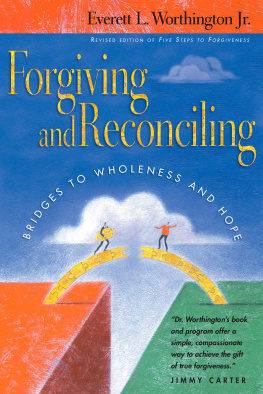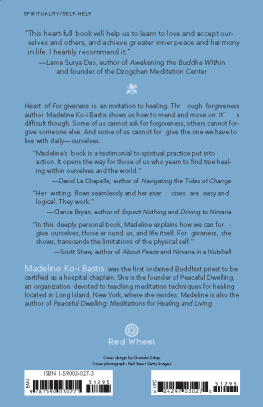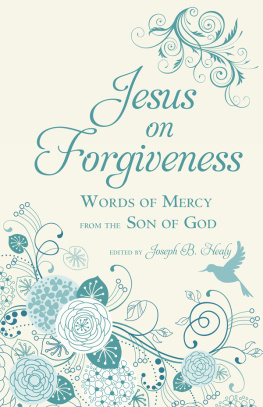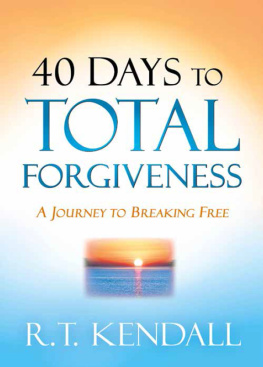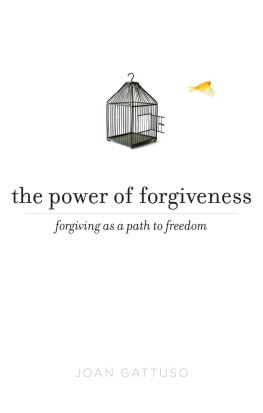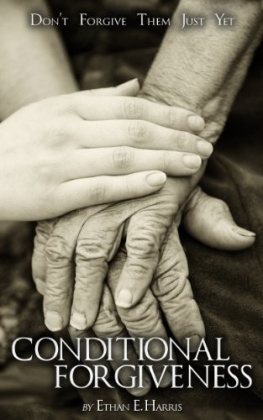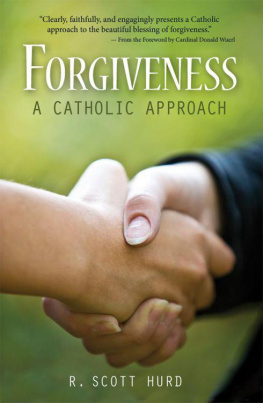
THE TRUTH ABOUT
________________
forgiveness
THE TRUTH ABOUT
________________
forgiveness
John MacArthur

2012 by John MacArthur
All rights reserved. No portion of this book may be reproduced, stored in a retrieval system, or transmitted in any form or by any meanselectronic, mechanical, photocopy, recording, scanning, or otherexcept for brief quotations in critical reviews or articles, without the prior written permission of the publisher.
Published in Nashville, Tennessee, by Thomas Nelson. Thomas Nelson is a registered trademark of Thomas Nelson, Inc.
Thomas Nelson, Inc., titles may be purchased in bulk for educational, business, fund-raising, or sales promotional use. For information, please e-mail SpecialMarkets@ThomasNelson.com.
Unleashing Gods Truth, One Verse at a Time is a trademark of Grace to You. All rights reserved.
Compiled from previously published material in The Jesus You Cant Ignore, The Vanishing Conscience, Hard to Believe, The Prodigal Son, and Welcome to the Family.
Unless otherwise indicated, Scripture quotations are taken from THE NEW KING JAMES VERSION. 1982 by Thomas Nelson, Inc. Used by permission. All rights reserved.
Scripture quotations marked NASB are taken from the NEW AMERICAN STANDARD BIBLE. The Lockman Foundation 1960, 1962, 1963, 1968, 1971, 1972, 1973, 1975, 1977, 1995. Used by permission.
Scripture quotations marked KJV are taken from the King James Version.
Library of Congress Cataloging-in-Publication Data
MacArthur, John, 1939
The truth about forgiveness / John MacArthur.
p. cm.
Includes bibliographical references (p. ).
ISBN 978-1-4002-0415-1
1. Forgiveness of sin. 2. Forgiveness--Religious aspects--Christianity. I.Title.
BT795.M28 2012
234.5dc23
Printed in the United States of America
12 13 14 15 16 QG 6 5 4 3 2 1
CONTENTS
CHAPTER 1
WE NEED TO BE
FORGIVEN
THE BAD NEWS
Thousands of babies are born every day into a world filled with bad news. The term bad news has become a colloquialism to describe our era.
Why is there so much bad news? Its simple. The bad news that occurs on a larger scale is only the multiplication of what is occurring on an individual level. The power that makes for bad news is sin.
THE WORSE NEWS
A common contemporary response to this bad news is to deny it or try to explain it away. Perhaps the most prevalent means of escaping blame is by classifying every human failing as some kind of disease. Drunkards and drug addicts can check into clinics for treatment of their chemical dependencies. Children who habitually defy authority can escape condemnation by being labeled hyperactive or having ADD (attention deficit disorder). Gluttons are no longer blameworthy; they suffer from an eating disorder. Even the man who throws away his familys livelihood to pay for prostitutes is supposed to be an object of compassionate understanding; he is addicted to sex.
An FBI agent was fired after he embezzled two thousand dollars, then gambled it away in a single afternoon at a casino. Later he sued, arguing that his gambling addiction was a disability, so his firing was an act of illegal discrimination. He won the case! Moreover, his therapy for the gambling addiction had to be funded under his employers health-care insurance, just as if he had been suffering from appendicitis or an ingrown toenail.
These days everything wrong with humanity is likely to be explained as an illness. What we used to call sin is more easily diagnosed as a whole array of disabilities. All kinds of immorality and evil conduct are now identified as symptoms of this or that psychological illness. Criminal behavior, various perverse passions, and every imaginable addiction have all been made excusable by the crusade to label them medical afflictions. Even commonplace problems, such as emotional weakness, depression, and anxiety, are also almost universally defined as quasi-medical, rather than spiritual, afflictions.
The American Psychiatric Association publishes a thick book to help therapists in the diagnosis of these new diseases. The Diagnostic and Statistical Manualof Mental Disorders (Third Edition, Revised)or DSM-III-R, as it is popularly labeledlists the following disorders:
Conduct Disordera persistent pattern of conduct in which the basic rights of others and major age-appropriate societal norms or rules are violated.
Oppositional Defiant Disordera pattern of negativistic, hostile, and defiant behavior.
Histrionic Personality Disordera pervasive pattern of excessive emotionality and attention-seeking.
Antisocial Personality Disordera pattern of irresponsible and antisocial behavior beginning in childhood or early adolescence and continuing into adulthood.
And there are dozens more like those. Multitudes of parents, influenced by such diagnoses, refuse to punish their children for misbehavior. Instead, they seek therapy for ODD, or HDP, or whatever new diagnosis fits the unruly childs behavior.
In the words of one author, the disease-model approach to human behavior has so overwhelmed us as a society that we have gone haywire. We want to pass laws to excuse compulsive gamblers when they embezzle money to gamble and to force insurance companies to pay to treat them. We want to treat people who cant find love and who instead (when they are women) go after dopey, superficial men or (when they are men) pursue endless sexual liaisons without finding true happiness. And we want to call all these thingsand many, many moreaddictions.
What is this new addiction industry meant to accomplish? More and more addictions are being discovered, and new addicts are being identified, until all of us will be locked into our own little addictive worlds with other addicts like ourselves, defined by the special interests of our neuroses. What a repugnant world to imagine, as well as a hopeless one. Meanwhile, all the addictions we define are increasing.
Worse yet, the number of people who suffer from such newly identified sicknesses is increasing even faster. The therapy industry is clearly not solving the problem of what Scripture calls sin. Instead it merely convinces multitudes that they are desperately sick and therefore not really responsible for their wrong behavior. It gives them permission to think of themselves as patients, not malefactors. And it encourages them to undergo extensiveand expensivetreatment that lasts for years, or better yet, for a lifetime. These new diseases, it seems, are ailments from which no one is ever expected to recover completely.
The sin-as-disease model has proved to be a boon to the multibillion-dollar counseling industry, and the shift toward long-term or even permanent therapy promises a bright economic future for professional therapists. One psychologist who has analyzed this trend suggests there is a clear strategy to the way therapists market their services:
1. Continue the psychologization of life;
2. Make problems out of difficulties and spread the alarm;
3. Make it acceptable to have the problem and be unable to resolve it on ones own;
4. Offer salvation [psychological, not spiritual].
He notes that many therapists purposely extend their treatments over periods of many years, even after the original problem that provoked the client to seek counseling has been solved or forgotten. They go on for so long and the client becomes so dependent on the therapist that a special period of timesometimes extending to six months or moreis required to get the client ready to leave.
Next page
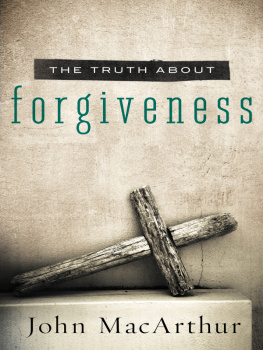
![England Maurice - Business for the glory of God: [the Bibles teaching on the moral goodness of business]](/uploads/posts/book/164245/thumbs/england-maurice-business-for-the-glory-of-god.jpg)
